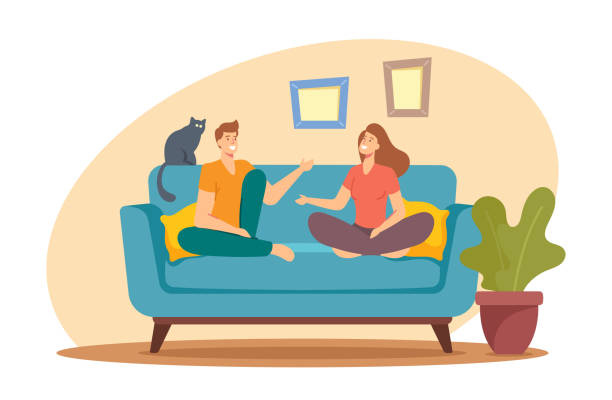I was asked to give a guest lecture last week to a college class about what I’ve learned as a couples therapist. As I sat down to write, the first thing that came to mind was this: We are all blind.
We all have blind spots. Those of us who think we don’t, have even bigger blind spots. Our personality structures are created to protect us in this complicated and crazy life. But the parts of our personality that protect us, also keep us blind to parts of ourselves. From the objective role of a therapist, it’s easy for me to see the blind spots in my clients, but the truth is, I know I have plenty of my own. In therapy, it usually looks like this:
Partner A: “Whenever I try to tell you how I feel, you get defensive and make it about you. I don’t feel heard.”
Partner B: “Well, I don’t feel heard either! How am I supposed to get my needs met, if I can’t ask you?”
Partner A: “See? You just did it again. I’m trying to tell you how I feel, and you just made it about you.”
Partner B: “So I’m just supposed to listen to you all the time? What about me? When do I get to talk about how I feel?”
Partner A, exasperated: “I feel like I’m always listening to you. And here you go again…”
Partner B is blind to the fact that he does turn every conversation back to himself and has a really hard time holding space for his partner and really hearing her. There are thousands of different versions of this as you can imagine.
The only way out of this is to humbly accept the fact that we all have blind spots. Ask your partner: “What am I missing here? What am I not seeing?” “What is it like to be my partner?”
Second, there is no objective reality in relationships. Period. This is what a typical conversation in couples therapy sounds like:
Partner A: “I help put the kids to bed every night.”
Partner B: “Excuse me? What did you say?”
Partner A: “What? I help put the kids to bed almost every night. At least 4 nights a week!”
Partner B, shaking their head: “It’s more like once or twice a week.”
Partner A: “Are you serious? I was just reading with Sam last night!”
And on and on… OR…Here’s another common one:
Partner A: “We have sex once or twice a week.”
Partner B: “Once or twice a week? Try once or twice a month!”
Partner A: “No, it’s at least once a week.”
Partner B: It’s been almost two weeks since we last had sex!”
Partner A: “Are you sure? It seems like we just had it.”
You get the picture. As a couples therapist listening to these two versions of reality, I have no idea what the actual numbers are. And the truth is, it doesn’t really matter all that much. What matters is that this is how each of them feel about what’s going on between them. Instead of arguing about numbers or statistics, try to get underneath to the feeling level. “How could I be more helpful at bedtime?” “What is your experience of me at bedtime?” Or “How are you feeling about our sex life? Are you satisfied with the amount of sex we have? Would you like more/less? What would you like to be different?”
“The solution to relationship problems is always a healthy curiosity mixed with assumed good intent.”
The third thing I’ve learned is that we all make sense to ourselves. What seems crazy or irresponsible to one person, seems perfectly reasonable and fun to another. What seems totally normal and completely acceptable to one partner, can seem ridiculous or offensive to another. Again, the answer is curiosity. There is no right and wrong to most issues that come between couples. There are just differences. Most likely, you won’t be able to talk your partner into seeing things your way, but you can try to understand the way they think and make space in your relationship for differences.
The fourth thing I’ve learned is something Stephen Covey taught years ago, “Seek first to understand, then to be understood. If we want to be understood, we first have to take the time and have the patience to understand our partner. Normally both partners are seeking to be understood at the same time and this turns into a hellish merry-go-round of an argument that never goes anywhere and seems to never end! Usually as soon as one person stops talking, the other person starts in on their own perspective immediately and neither person ends up feeling understood or validated.
Finally, I’ve learned that our ego just wants to be right and protect itself. It doesn’t want intimacy or closeness. In order to be close and feel connected to our partner, we must tame our ego.
The solution to relationship problems is always a healthy curiosity mixed with assumed good intent. “I believe my partner meant well. I don’t understand their behavior, but before I let myself get upset about it, I’m going to ask for clarification and try to understand their point of view.” There is always a tangible feeling of relief that comes when a partner finally feels understood and validated. You can see the walls crumble, the heart soften, and the body relax. I believe we are all doing the best we can with the knowledge and awareness that we have. Let’s assume good intent, get curious, and offer our partner grace. Wouldn’t would want them to do the same for us?





Beautiful. So simple. Though not easy. Still a wonderful compass to navigate by. "I believe we are all doing the best we can with the knowledge and awareness that we have. Let’s assume good intent, get curious, and offer our partner grace."
Thank you Margo. It is simple and difficult!